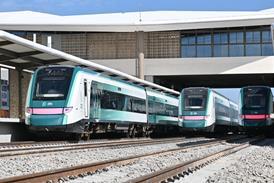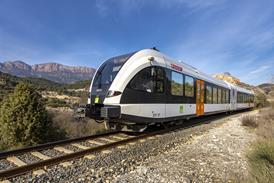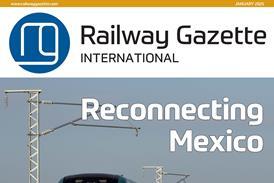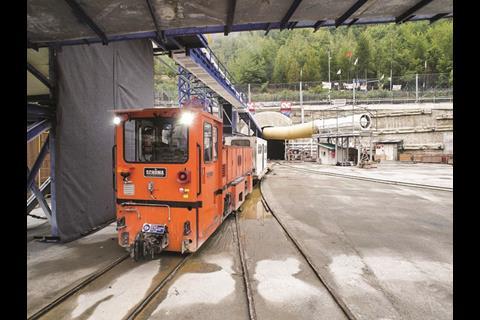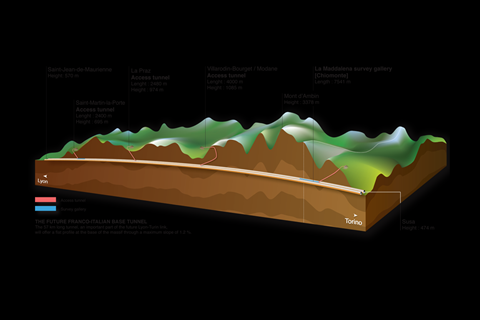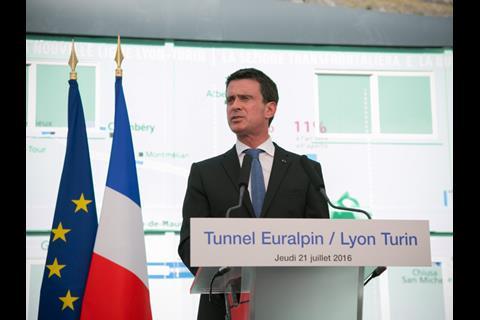ANALYSIS: Conte says no, but Salvini says yes. This sums up the Italian media’s view of the conflict at the heart of the new ‘yellow and green’ government in Roma over the future of the Lyon – Torino trans-Alpine railway, writes Christian Scasso.
A coalition of the radical Five Star Movement and the League took office in May, and already the attitude of the two parties towards infrastructure investment is emerging as a key fault line, with the planned 235 km railway between Torino and Lyon the principal battleground. The new line, which includes the 57 km cross-border Mont Cenis base tunnel, has an indicative budget of €8·3bn. The League, which has its roots in prosperous northern Italy, has always backed the Lyon – Torino project, but M5S is strongly opposed, arguing that ‘Italy should not be throwing its money out of the window’ and promising to ‘focus on improving the daily life of Italians’.
What started out as furtive rumours about discord over the railway has escalated in recent weeks to an increasingly public spat, with Prime Minister Giuseppe Conte and his M5S colleagues on one side and high-profile Interior Minister Matteo Salvini, leader of the League, on the other.
Caught in the middle are regional leaders in Piemonte and Lombardia which stand to benefit from the enhanced rail connectivity the line would provide. Lombardia Regional President Sergio Chiamparino has backed Salvini unequivocally, even suggesting that were the work to be halted, a local plebiscite could be held to restart it. ‘If the project were to be cancelled, it would be a fatal blow to the cultural, economic, environmental and social development of our region’, he told local press.
Toninelli talks tough
Nevertheless, national transport and infrastructure minister Danilo Toninelli, an M5S member, has been hardening his opposition since his appointment in June, and the decision to replace the management board of national railway holding company FS Group could be seen as an ominous portent.
Toninelli has reportedly claimed that the price tag for the Italian section of the line is €60m per km, three times the claimed cost of a high speed line in France. Aligning himself closely with the ‘No TAV’ campaign group which has fought a bitter campaign against the construction work on the Italian approaches to the tunnel, Toninelli has reportedly questioned what the motives might be for allowing such a perceived cost disparity to arise, and who might benefit from it.
For the time being, Toninelli says he is keen to have ‘in his hands the firm data on the technical and financial aspects of the project’ before taking any decisions. Yet according to insiders, he has refused on five separate occasions to meet the government’s own Special Commissioner for Lyon – Torino, Paolo Foietta, who is keen to present him with a formal dossier on progress to date.
While the minister has reportedly said that it is ‘useless’ to have meetings that ‘only put forward the case for the project’, Foietta has made clear in the local press that the railway is comparable in cost and scope to the Gotthard and Brenner base tunnels in Switzerland and Austria, which are recently completed and under construction respectively.
International pressure
While the discord between the two governing parties over Lyon – Torino has not yet unleashed a full-scale political crisis, the international nature of the project is adding to the pressure. There is already a strained relationship at a political level between Italy and the French government of Emmanuel Macron, while the EU, of which M5S is a vociferous critic, is an important financial backer of the project. EU funds are expected to meet 41% of the total cost with the remainder being split between Italy (58%) and France (42%).
Four inter-governmental agreements covering the proposed railway were signed between 1996 and 2015, before a formal accord was ratified by both parliaments at the end of 2016. While overall construction remains at an early stage, substantial progress has nevertheless been made, with around €1bn of feasibility studies, design work and test bores having been undertaken.
Three test bores have been completed on the French side, totalling 8·6 km, and 7·5 km has been completed in Italy, while excavation of a gallery 9 km in length has been underway at Saint-Martin la Porte in France since January 2015. Estimates suggest that cancellation of the project at this stage could cost €2bn and put 4 000 jobs at risk, with Italian contractors particularly affected.
‘We must remember that this railway is not only important for the two countries directly affected, but for the whole of Europe’, says Enrico Brivio, a spokesman for the European Commission’s transport directorate DG Move. ‘It is important that the project is taken forward on time and in a financially responsible way.’


